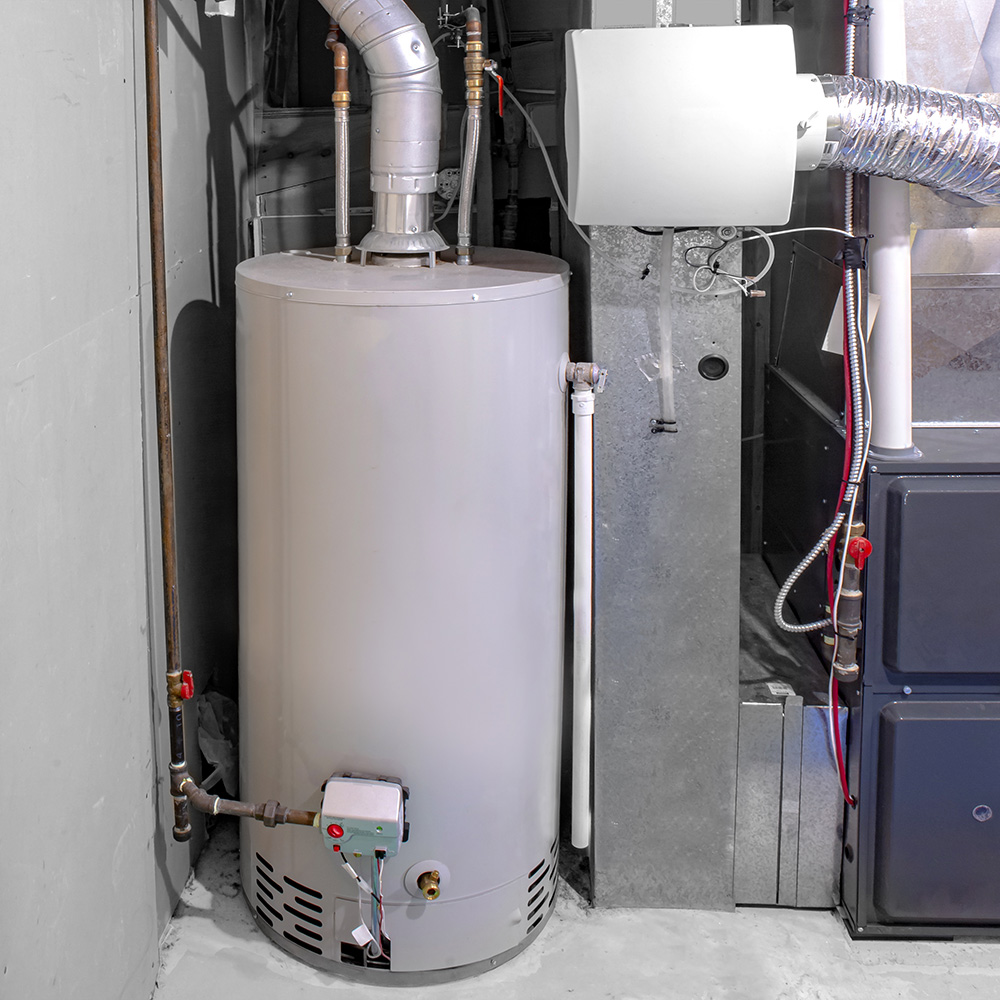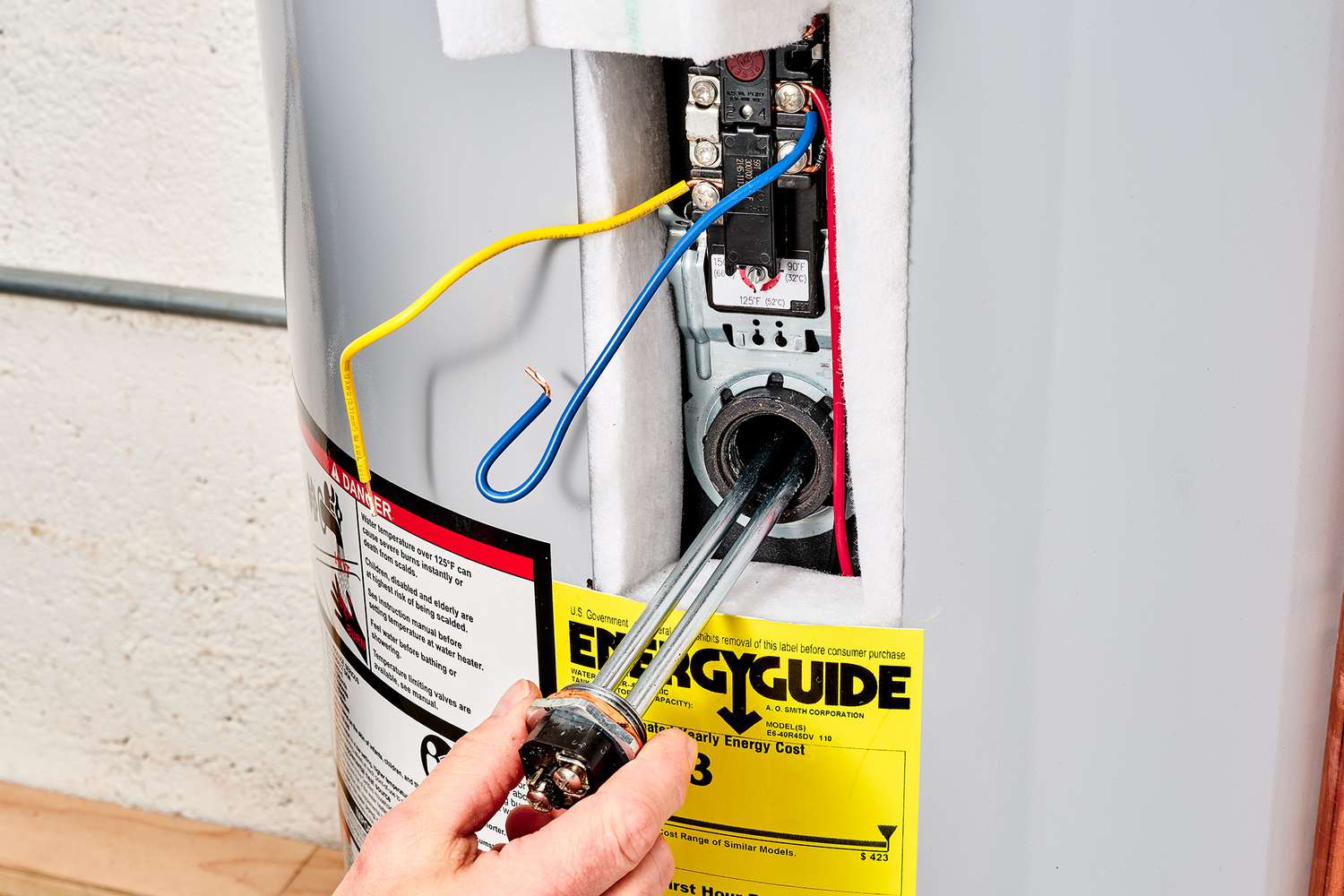Water heater elements should be replaced every 6 to 10 years. Regular maintenance can extend their lifespan.
Water heaters are essential appliances in many homes, providing hot water for daily needs. Over time, the elements within a water heater can wear out or become less efficient. Replacing these elements periodically ensures the heater functions optimally and avoids unexpected breakdowns.
Regular inspection can help identify early signs of wear, such as inconsistent water temperatures or unusual noises. By replacing the elements every 6 to 10 years, homeowners can maintain a reliable supply of hot water and prevent costly repairs. Proper maintenance and timely replacement of water heater elements contribute to the longevity and efficiency of the water heating system.
/replace-the-heating-element-water-heater-1824886-11-082cb081cf2740fca47a30001cb701a1.jpg)
Credit: www.thespruce.com
Signs Of A Failing Water Heater Element
Knowing the signs of a failing water heater element can save you headaches. Early detection ensures your water heater works efficiently. Below are key indicators that your water heater element might be failing.
Inconsistent Water Temperature
One clear sign of a failing element is inconsistent water temperature. You might notice hot water runs out quickly. At times, the water may not get hot at all. This inconsistency suggests the element isn’t functioning well.
Unusual Noises
Another sign is hearing unusual noises from the heater. Sounds like popping or rumbling mean trouble. These noises often indicate sediment buildup around the element. This buildup causes the element to overheat and fail.
Discolored Water
Seeing discolored water from your taps? This could be another sign. Rusty or brown water suggests corrosion. Corrosion affects the element and the tank. Ignoring this can lead to bigger problems. Always address discoloration promptly.
Factors Influencing Replacement Frequency
Understanding how often you should replace water heater elements is crucial. Several factors influence the replacement frequency. Knowing these factors can help you maintain your water heater efficiently.
Water Quality
Water quality plays a significant role in the lifespan of water heater elements. Hard water contains high levels of minerals like calcium and magnesium. These minerals can cause scale buildup on the elements. This buildup makes the water heater work harder, which leads to quicker wear and tear.
To check your water quality, consider using a water hardness test kit. If your water is hard, installing a water softener can help. Soft water reduces scale buildup and extends the life of the elements.
Usage Patterns
How often and how much hot water you use affects the elements. Frequent use means the elements work more, leading to faster degradation. Households with many members tend to use more hot water.
Consider your daily hot water usage. If you use hot water multiple times a day, your elements might need replacement more often. Reducing your hot water usage can help prolong the life of the heater elements.
Type Of Water Heater
Different water heaters have different lifespans for their elements. Electric water heaters typically have replaceable elements. Tankless water heaters usually have longer-lasting elements but can be more expensive to repair.
| Type of Water Heater | Average Element Lifespan |
|---|---|
| Electric Water Heater | 3-5 years |
| Tankless Water Heater | 5-10 years |
Consider the type of water heater you have. Check the manufacturer’s guidelines for the recommended replacement frequency. Regular maintenance can also help extend the lifespan of the elements.
- Water quality affects the buildup on the elements.
- Usage patterns determine how hard the elements work.
- Type of water heater influences the longevity of the elements.
Average Lifespan Of Water Heater Elements
The average lifespan of water heater elements varies. Factors like usage, water quality, and maintenance affect longevity. Understanding the lifespan helps in planning replacements.
Electric Water Heaters
Electric water heater elements typically last between 6 to 10 years. Hard water can shorten this lifespan. Regular maintenance extends the element’s life. Flushing the tank yearly removes sediment buildup.
- Average Lifespan: 6-10 years
- Factors: Water quality, Usage, Maintenance
| Water Quality | Expected Lifespan |
|---|---|
| Soft Water | 10 Years |
| Hard Water | 6-8 Years |
Gas Water Heaters
Gas water heaters use a burner, not elements. The burner assembly lasts longer. Replacing it every 10-15 years is typical. These heaters also need regular maintenance.
- Average Lifespan: 10-15 years
- Factors: Maintenance, Gas Quality
- Check the burner assembly yearly.
- Clean the tank to remove sediment.
- Inspect the gas lines for leaks.
Understanding these lifespans helps in planning timely replacements. This ensures efficient and reliable water heating in your home.

Credit: www.youtube.com
Diy Vs. Professional Replacement
Replacing water heater elements can be tricky. You might wonder if you should do it yourself or hire a professional. Each option has its own benefits and drawbacks. This guide will help you decide which route to take.
Pros And Cons Of Diy
DIY replacement can save you money, but it comes with risks. Before starting, consider these pros and cons:
| Pros | Cons |
|---|---|
|
|
When To Call A Professional
In some cases, hiring a professional is the better choice. Here are situations where you should call an expert:
- You lack the necessary tools.
- The water heater is under warranty.
- There are complex electrical connections.
- You need a quick, guaranteed fix.
Professionals have the expertise to handle complex issues. They ensure safety and efficiency. This peace of mind is often worth the cost.
Steps To Replace A Water Heater Element
Replacing a water heater element can seem daunting. It is a manageable DIY task with the right guidance. This section breaks down the steps to replace a water heater element. Follow these steps to ensure a smooth replacement process.
Tools And Materials Needed
- Replacement water heater element
- Screwdriver
- Wrench
- Multimeter
- Garden hose
- Teflon tape
- Bucket
Safety Precautions
Safety is crucial when working with electrical appliances. Ensure you follow these precautions:
- Turn off the power supply to the water heater.
- Test with a multimeter to confirm no power is present.
- Wear gloves to protect your hands.
- Keep a fire extinguisher nearby.
Step-by-step Guide
- Turn off the power: Switch off the circuit breaker for the water heater.
- Drain the tank: Attach a garden hose to the drain valve. Open the valve and let the water flow into a bucket.
- Remove the access panel: Use a screwdriver to take off the panel covering the element.
- Disconnect the wires: Use a multimeter to ensure no power is present. Then, disconnect the wires from the element.
- Remove the old element: Use a wrench to unscrew the old element. Take it out carefully.
- Install the new element: Wrap the threads with Teflon tape. Screw the new element into place securely.
- Reconnect the wires: Attach the wires to the new element following the original configuration.
- Refill the tank: Close the drain valve. Open the cold water supply to refill the tank.
- Turn on the power: Switch the circuit breaker back on.
- Check for leaks: Inspect the new element and connections for any leaks.
Following these steps ensures a proper replacement process. It will help extend the life of your water heater.

Credit: www.homedepot.com
Preventive Maintenance Tips
Replacing water heater elements can be costly. Regular preventive maintenance can extend their lifespan. Below are some essential tips to keep your water heater in top condition.
Regular Inspections
Regular inspections can help you spot problems early. Check the water heater every few months. Look for signs of rust or leaks. Inspect the electrical connections for any damage. Tighten any loose connections to prevent electrical issues.
| Inspection Points | Frequency |
|---|---|
| Check for leaks | Every 3 months |
| Inspect electrical connections | Every 3 months |
| Look for rust | Every 3 months |
Flushing The Tank
Flushing the tank removes sediment build-up. Sediment can cause the heater to work harder. This reduces its efficiency and lifespan. Flush the tank at least once a year.
- Turn off the power supply.
- Connect a hose to the drain valve.
- Let the water flow out until clear.
- Close the valve and remove the hose.
- Turn on the power supply.
Using Water Softeners
Using water softeners can prevent mineral build-up. Hard water causes mineral deposits in the tank. This affects the heater’s performance. Install a water softener if your area has hard water.
- Water softeners reduce calcium and magnesium.
- They extend the life of heating elements.
- They improve water heater efficiency.
Frequently Asked Questions
How Often To Replace Water Heater Elements?
Water heater elements generally need replacement every 3-5 years. Frequent maintenance can prolong their life. Regularly check for signs of wear and inefficiency.
What Are Signs Of A Failing Water Heater Element?
Signs include inconsistent water temperature, slow heating, and unusual noises. Increased energy bills may also indicate a failing element. Regular inspections help identify issues early.
Can I Replace A Water Heater Element Myself?
Yes, you can replace it yourself if you have basic plumbing skills. Follow the manufacturer’s instructions and ensure the power is off. However, consider hiring a professional for safety.
How Long Do Water Heater Elements Last?
Water heater elements typically last 3-5 years. Their lifespan depends on usage and water quality. Regular maintenance can extend their longevity.
Conclusion
Replacing water heater elements every 3-5 years ensures optimal performance. Regular maintenance can extend the lifespan of your unit. Always consult your water heater’s manual for specific guidelines. Monitoring your water heater’s efficiency helps avoid unexpected breakdowns. Keep your home warm and water hot by staying proactive with replacements.

